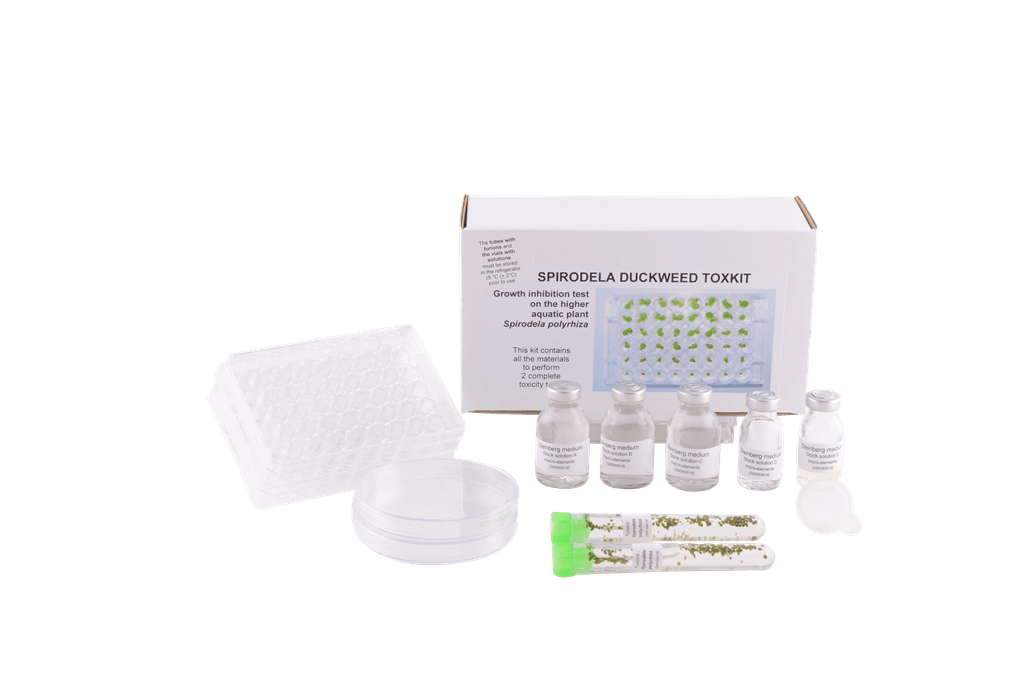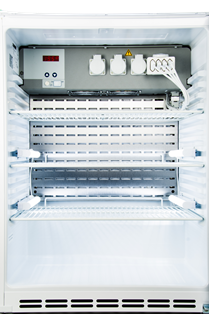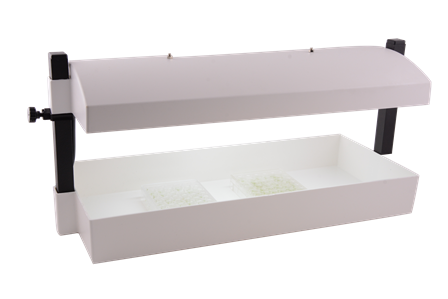
Duckweed toxkit F
The Spirodela duckweed toxicity test is intended for toxicity screening of chemicals, effluents, pesticides, surface waters, wastewaters, groundwaters, sediment pore waters and elutriates.
Duckweed toxkit F contains all the materials you need to perform two 72h growth inhibition tests with the higher aquatic plant duckweed species Spirodela polyrhiza. This cost-effective and culture-independent bioassay strictly adheres to ISO Standard 20227.
How to order?
DUCKWEED TOXICITY TEST
Test criterion
The Spirodela duckweed toxicity test is a 72h bioassay based on the growth inhibition of the “first frond” of Spirodela polyrhiza after 3 days of exposure to a dilution series of the toxicant, with calculation of the 72h EC50. You can determine growth inhibition of the duckweed by area measurement of the first frond with the aid of digital image analysis.
Contents of the Duckweed toxkit F
- Tubes with turions (dormant vegetative buds), which you can germinate on demand to supply the live biota for the duckweed toxicity test.
- Concentrated growth and toxicant dilution medium, germination/test containers and a spatula for the transfer of the germinated turions to the test plate.
- Short Bench Protocol and standard operating procedure brochure with easy-to-follow instructions and detailed illustrations.
- Data treatment sheets and a Quality Control specification sheet with batch number of the turions and the media.
- Tubes with turions (dormant vegetative buds), which you can germinate on demand to supply the live biota for the duckweed toxicity test.
- Concentrated growth and toxicant dilution medium, germination/test containers and a spatula for the transfer of the germinated turions to the test plate.
- Short Bench Protocol and standard operating procedure brochure with easy-to-follow instructions and detailed illustrations.
- Data treatment sheets and a Quality Control specification sheet with batch number of the turions and the media.
All test materials and equipment included in the Duckweed toxkit F are available separately.
Benefits of the duckweed toxicity test
- We produce high-quality turions in strictly controlled conditions. This way, we preclude variability associated with recruitment/maintenance of live stocks in conventional duckweed bioassays.
- The quality of the standardised test medium is highly uniform, thanks to simple dilution of concentrated solutions of “Steinberg medium” with deionised water.
- A Quality Control test with a reference chemical is described in detail, so you can easily check accuracy and reproducibility.
- You can germinate the turions on demand, which eliminates the need and the costs of continuous culturing and maintenance of your test organisms.
- The Spirodela duckweed toxicity test requires minimal space and equipment:
- incubator with lateral lights
- conventional laboratory glassware
- If you store the turions properly, you can prolong their shelf life for several months and reduce test scheduling constraints.
- Simple handlings and scorings.
- Total performance time of the growth inhibition test is approximately 2 hours.
- Area measurements of the first fronds are displayed on a photo of the multiwell test container, without any prior manipulation of the test organisms.
- We can provide you with a computer program for easy Toxkit data treatment and calculations of the 72h EC50.
The sensitivity of the duckweed Spirodela polyrhiza is comparable to the sensitivity of the duckweed species Lemna minor used in conventional duckweed assays following ISO Standard 20079 and OECD Guideline 221.
- The duckweed toxkit F is used in many environmental laboratories and research institutes worldwide and is validated by an extensive international interlaboratory comparison.
- Our Spirodela duckweed toxicity test complies with ISO Standard 20227, for regulatory testing with aquatic higher plants.
Interested in buying Duckweed toxkit F?
It contains all necessary materials to perform two 72h growth inhibition tests with the higher aquatic plant duckweed species Spirodela polyrhiza.


